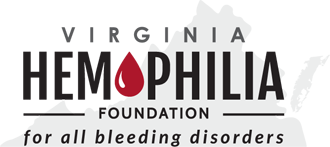VHF community member, VCU HTC social worker, and NBDF’s 2023 Social Worker of the Year Lauren Dunn was recently interviewed by fellow VHF and NBDF National Youth Leadership Institute (NYLI) member Paxton Mills in an installment of our interview series highlighting leaders across the bleeding disorders community, both locally and nationally. Read their conversation to learn more about Lauren’s journey finding a home in HTC social work and hopes for VHF as the organization evolves.
How did you first become involved in the bleeding disorders community?
I started as the social worker at the VCU HTC in 2003. I was interested in working in health care and found the job posting as part of my general job search. I had learned a lot about the HIV/AIDS impact on the hemophilia community in college classes and was familiar with Ryan White’s story, but really didn’t know anything more than that about hemophilia. I really had no idea that a center providing care for persons with bleeding disorders existed in my own city. I interviewed with Jan and Mindy (recently retired HTC nurses) and knew right away that I’d found a great fit! I liked the idea of working in a program that provided more than just clinical care and I could tell the team was really passionate about the patients and the work of the HTC.
What does your current role entail? What unique perspective/lens does social work add to the bleeding disorders community?
My role has changed a lot over the years, so social work is now just one part of my role. I also have responsibilities with our state program to help with health insurance issues at individual and policy levels as well as coordinating with our HTC team to meet our grant goals. The social work perspective focuses on providing caring for the whole person. As an HTC, our primary goal is to help you manage your bleeding disorder, but there is a lot more to you and your life than just your health and managing a chronic condition. That’s where social workers often come in, to help with all the “non-medical” challenges that ultimately impact health and care. The thing I love the most about social work as a profession is that it combines helping at a small scale with individual/family level support, but also has a strong focus on social justice and social policy issues.
What is your favorite part about your job in social work?
I like being able to develop long term relationships with patients and families. Since I have been here so long, I am now seeing adult patients who I have known since they were born! I am also starting to meet the new generation of grandchildren of adults I have known for many years. It’s really a privilege to be part of that full circle experience.
What would you want people outside of our community to know or understand about us?
I guess I will put on my policy hat now and say it’s how appreciative those outside this community should be for how much this community advocates for things that have impact far beyond only bleeding disorders. This community has fought hard to be a voice in the halls of Congress, local governments, health plans, etc. for decades. The impact of that work is so impressive. For example, the provisions in the ACA that eliminated lifetime and annual caps and pre-existing waiting periods: this community felt the brunt of those policies and advocated hard for those protections in the ACA, which now help so many beyond the bleeding disorders community.
What is something you hope to achieve with VHF or a vision you have for our community?
Continuing our great collaboration between HTCs and VHF is something I am committed to. A lot of things have changed in this community in the time I have been here, and I think the chapter and HTCs alike will need to continue to adapt and change with the times to ensure we are meeting the needs of the community.
Do you have a favorite event or memory during your time contributing to VHF?
I have so many memories over the past 20 years! When I was a very new social worker, a group of adults approached me about wanting to go whitewater rafting. I had no clue if that was advisable, much less feasible, but since our HTC is in a city with rapids running right through downtown, I agreed to look into it. After a lot of planning and help from others, we were able to safely plan an event and had a great day out on the river (and canal for those less excited about the rapids). That will always be one of my favorite memories!
What would you say to community members on the periphery who are thinking about getting involved but are not sure how?
VHF is a really welcoming group. It can be intimidating to attend an event for the first time when you don’t know anyone, but my experience has been that everyone goes above and beyond to welcome new members and help you feel comfortable and supported. Attending a chapter event is a great way to get involved and to get a sense of all the chapter has to offer.
Is there anything else you would like to share with me for the write-up?
Thanks for reaching out. I am always grateful for the strong relationship between HTCs in and the chapters in Virginia!
